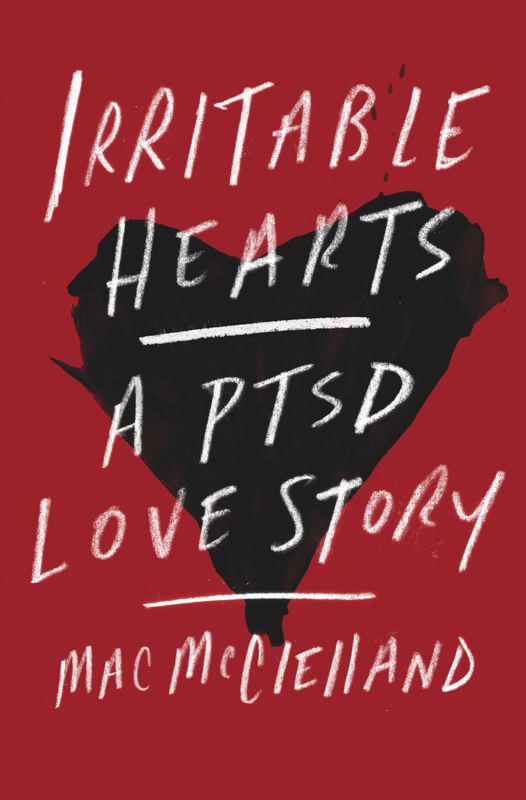
Irritable Hearts
A PTSD Love Story
داستان عشق PTSD
کتاب های مرتبط
- اطلاعات
- نقد و بررسی
- دیدگاه کاربران
نقد و بررسی

March 2, 2015
This raw look at life with PTSD begins in Haiti in September 2010, where an earthquake has just shaken the very fabric of society. McClelland (A Twisted Trail) is one of the journalists who comes to Port-au-Prince to cover femicide and hate crimes, and she witnesses "something." She does not provide details, only writing that it has to do with rape, and that watching the "something" is the closest she's ever been to someone else's terror. Immediately afterward, she feels "a disembodied version of myself hovering somewhere behind me and to the left." This dissociation and a psychological numbnessâso severe that she felt no emotion when her boyfriend, Nico, placed a rose on her chest and fed her strawberries in bed one dayâare symptoms that strain her ability to function. McClelland pulls herself away from drinking binges with the help of Nico's steadiness, a somatic therapist's expertise, and the affirmation she receives from PTSD survivors who thank her for reporting on the illness. McClelland is writing this memoir for those survivors. She asks readers who haven't experienced dissociation and numbness to empathize with psychological conditions that they won't fully understand, and makes it easy to grant that request.

December 1, 2014
Sprawling memoir of an adventurous journalist's experiences with PTSD.National Magazine Award-nominated writer McClelland (For Us Surrender Is Out of the Question: A Story from Burma's Never-Ending War, 2010) considered herself accustomed to tough environments. However, on the ground in Haiti to cover the chaotic reconstruction following the 2010 earthquake, she witnessed acts of sexual violence (left largely unspecified) that instilled in her a severe case of PTSD, manifesting in jolting physical symptoms: "[f]lashbacks of the screaming incident I witnessed in Haiti burst into my head and I lay there, soft and failed, choking on instant hard sobs." Yet on the same trip, she had begun an improbable romance with Nico, a youthful French soldier. When she was back in the United States, they kept in touch via Skype, but McClelland's PTSD symptoms and attendant depression became more debilitating. When she first published writing about her experience, she was condemned for solipsism, yet she also heard from many fellow sufferers, ranging from women who'd encountered domestic violence to a growing community of PTSD-afflicted combat veterans and their families: "They were the collateral damage that didn't end with veterans, that everyone pretended didn't exist...." As McClelland tried to hang on to her relationship with Nico, she realized that her experiences were representative of a large, undiagnosed demographic of suffering. She discovered that an extensive, therapy-based treatment regimen (involving the examination of every trauma in her past, including the explosive dissolution of her parents' relationship) allowed her to move forward gradually, into accepting Nico's impulsive marriage proposal. The author takes a maximalist approach, focusing exhaustively on her own experiences and grim sensations (as well as those of the people she encounters), so the narrative feels progressively less focused while remaining compassionate and perceptive regarding this elusive malady. McClelland's candor and empathy are admirable, but this would have benefited from more editorial shaping.
COPYRIGHT(2014) Kirkus Reviews, ALL RIGHTS RESERVED.

December 1, 2014
Human rights journalist McClelland returned from Haiti a changed woman. She was no stranger to horror, having witnessed disaster after disaster in war-torn countries, in refugee camps, and at sites of environmental disaster. But this was different. In this searing memoir and medical tale, McClelland recounts how she coped with her damaged mind, trying to overcome violent fantasies, emotional breakdowns, insomnia, and endless crying jags in the most unexpected places and under the most unexpected circumstances. She meets with other PTSD victims, researches PTSD, and writes articles about PTSD as well as this devastating memoir, even as she is still coming to terms with her condition. She talks to experts who have conducted comprehensive studies of combat stress, from Vietnam to Iraq to Afghanistan. She examines the history of psychological trauma and reveals that natural disasters, such as Hurricane Katrina, are another reliable source of PTSD. In all, an important addition to the growing literature on PTSD and its destructive effect on the human mind.(Reprinted with permission of Booklist, copyright 2014, American Library Association.)

September 1, 2014
This book will quickly follow publication of David J. Morris's The Evil Hours: A Biography of Posttraumatic Stress Disorder (Houghton Harcourt, Jan. 2015), which attests to our growing recognition of how pervasive and serious PTSD is. Returning home from covering the 2010 Haitian earthquake, award-winning human rights journalist McClelland began suffering bouts of sleeplessness, sobbing, and the vivid conjuring of violent images. Recognizing PTSD when she saw it, she set out to understand its history and consequences while learning to heal through love.
Copyright 2014 Library Journal, LLC Used with permission.

























دیدگاه کاربران